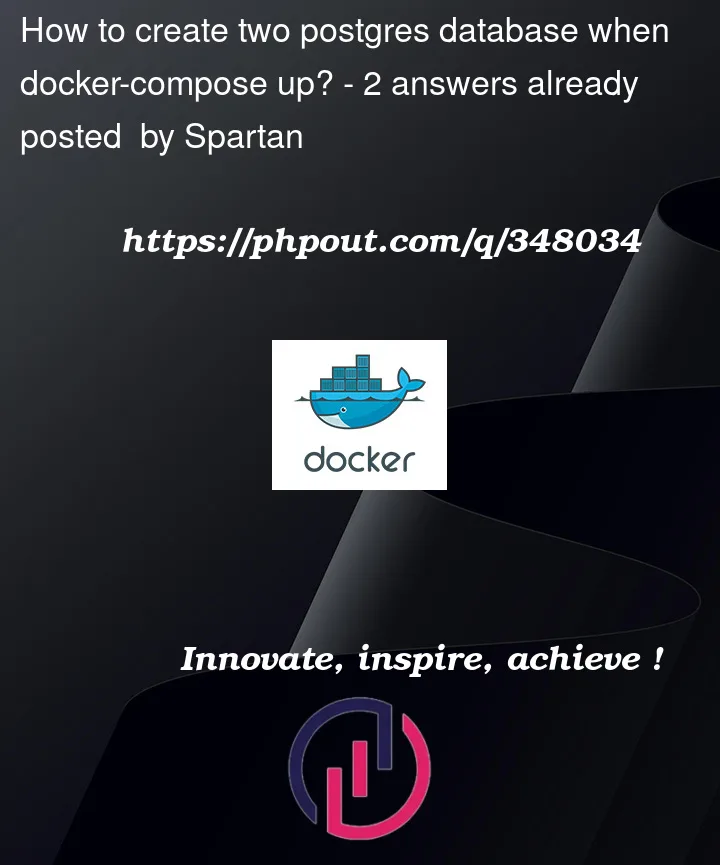Dockerfile:
FROM python:3.9
ENV PYTHONUNBUFFERED=1
RUN apt-get update && apt-get upgrade -y
&& apt-get install -y gcc gunicorn3 libcurl4-gnutls-dev librtmp-dev libnss3 libnss3-dev wget
&& apt-get clean
&& apt -f install -y
WORKDIR /App
COPY requirements.txt /App/
RUN pip install -r requirements.txt
COPY . /App/
>! RUN pip install django~=4.1.1
RUN mkdir -p /App/data/db/
RUN chown -R 1000:1000 /App/data/db/
EXPOSE 7000
EXPOSE 8001
`
I have base-compose file that contain database image, here is file content:
version: '3.3'
networks:
shared_network:
driver: bridge
services:
testdb:
image: postgres:latest
volumes:
- postgres_data:/var/lib/postgresql/data
environment:
- POSTGRES_DB=develop_db
- POSTGRES_USER=postgres
- POSTGRES_PASSWORD=postgres
ports:
- "5432:5432"
networks:
- shared_network
volumes:
postgres_data:
Here is my docker-compose file:
version: '3.3'
include:
- ./base-compose.yml
services:
test_develop:
container_name: test_develop
build: .
command: python manage.py runserver 0.0.0.0:7000
ports:
- "7000:7000"
env_file:
- ./environments/.env.develop
depends_on:
- testdb
networks:
- shared_network
links:
- testdb
Here is my docker-compose-prod.yml file:
version: '3.3'
include:
- ./base-compose.yml
services:
test_production:
container_name: test_production
build: .
command: python manage.py runserver 0.0.0.0:8001
ports:
- "8001:8001"
env_file:
- ./environments/.env.prod
depends_on:
- testdb
networks:
- shared_network
links:
- testdb
when i run the docker-compose up –build it create develop_db but i want to create prod_db too.
I try to create two database names develop_db and prod_db, when docker-compose up –build.
I used these two commands to run both docker-compose file.
docker-compose -f docker-compose up --build
docker-compose -f docker-compose-prod.yml up --build




2
Answers
You can control this generally through environment variables.
A key concept here is that Compose has the notion of a project. Everything in a Compose file is associated with a project, and the default Docker object names that Compose produces embed the project name. You can override the project name using a
docker-compose -poption or theCOMPOSE_PROJECT_NAMEenvironment variable. The project name defaults to the current directory name, so if you want to run two Compose setups from the same directory, you need to set the project name for one or the other.The related note here is that your two Compose files are almost identical, except for the container names (which Compose can assign), the Docker-internal port number (which doesn’t need to change), the specific environment file, and the host port. You could flatten this out into a single Compose file that works in both environments, with the correct settings
Now you can run
Compose will create a separate copy of this stack for each
COMPOSE_PROJECT_NAME: two networks (develop_defaultandprod_default), two volumes, two database containers, and two application containers. The two environments will be logically separate from each other, even though they’re running on the same host system.I just created init.sql file and add it into docker-entrypoint-init.db, this is how i did. Its better to create psql folder and add init.sql file into it.
Remove – POSTGRES_DB=develop_db this from the base-compose file and change it.
Here is my init.sql file. I just created DATABASE simply make sure you create DATABASE using USER & PASSWORD.
[


